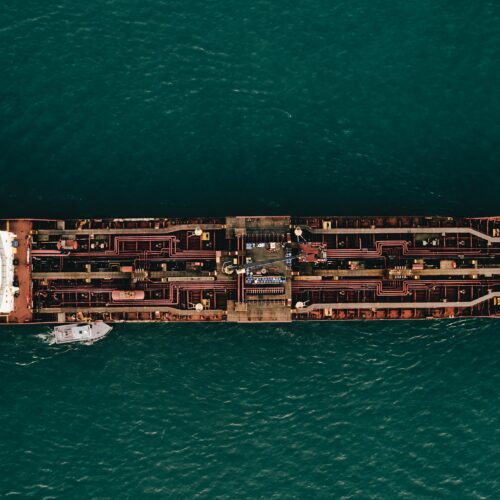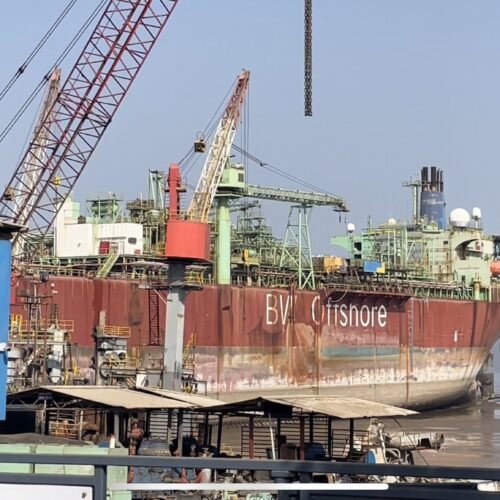Press Release – Brazilian Navy suddenly seizes its old warship forcing it to sea
NGOs urgently call on President Lula to prevent Navy from sinking toxic ship in the Atlantic
The former Brazilian Aircraft Carrier named SÃO PAULO, laden with asbestos, PCBs and other toxic waste materials, was seized on Friday and forced out to sea by the Brazilian Navy, claiming in an official notice yesterday that the move had to be done as the vessel was supposedly in imminent danger of running aground or sinking off the Brazilian coast.
Green groups that have been closely following the saga of the SÃO PAULO were shocked over this move and are not convinced by the Navy's sudden rationale that the ship posed an imminent danger. They note that while it has been known for weeks that there are minor breaches in the hull in need of repair, the Navy itself refused for over three months to allow the vessel to return to one of its facilities for repair or survey. The NGOs greatly fear that the Navy intends to never have the ship be returned to a port, never be re-examined for its quantity of hazardous wastes onboard, toxicity and suspected radioactivity, and will instead use an excuse of a small leak in the ship’s structure to force its sinking in the Atlantic Ocean.

BAN is citing the illegal seizure of a privately owned ship, as well as defiance of the Basel Convention. The latter requires the aircraft carrier to be safely returned to Brazil with Brazilian assistance, which the Navy has refused for three months. The London Protocol further forbids the intentional sinking of vessels unless all efforts have been first made to rid the ships of toxic waste residual materials such as heavy metals, asbestos and PCBs.
In a meeting held on 29 December, a Navy representative already alluded to a possible contingency action of sinking the ship. At that meeting, the issue of the small leak in the SÃO PAULO’s hull was discussed and it was concluded that the ship was not in imminent danger of sinking but should still be returned to a Brazilian port to undergo repairs prior to being put out to bid again for recycling. Following that meeting and a few weeks after the Lula Administration was installed, the coalition of NGOs wrote a letter to the new Minister of the Environment and Climate Change and to the director of IBAMA, the Brazilian Agency responsible for fulfilling Brazil's legal obligations under international law. The NGOs also issued a press release calling for the urgent safe docking of the vessel, fearing that it would indeed be abandoned by the Turkish owners. Within 24 hours of that press release, the Brazilian Navy, citing imminent hazard to the Brazilian population and environment inexplicably seized the vessel and seemingly forced a commercial tow ship to take it out to sea.
In addition to the economic loss of a vast quantity of secondary steel the SÃO PAULO contains, a forced sinking by the Brazilian government would result in hundreds of tonnes of asbestos, toxic and persistent PCBs, heavy metal-laden paints and possible radioactive materials to be released into the marine environment in violation of international law (London Protocol) [1].

NOTE
[1] Studies conducted at a US sinking site revealed toxic PCB leaching from a sunken aircraft carrier. According to the data, the leaching occurred at more than twice the US Navy and EPA’s pre-sinking modelled expectations. Leaching PCBs from the sunken vessel were found to be taken up by fish at the reef site, with an increase of concentrations in fish samples of 1,446% on average from pre-sinking to post- sinking.. As PCBs bioaccumulate in organisms and biomagnify in the food chain, they create health risks to organisms of all kinds. Due to PCB’s properties of persistence and toxicity, many scientists believe there is no safe level of exposure to PCBs. See BAN's report.
For more information:
Jim Puckett, Basel Action Network, e-mail: jpuckett@ban.org, Phone: +1 206-354-0391
Ingvild Jenssen, NGO Shipbreaking Platform, e-mail: ingvild@shipbreakingplatform.org, Phone: +32 (0)260.94.419
Related news

Platform News – Legambiente joins Platform’s campaign for sustainable ship recycling
The NGO Shipbreaking Platform welcomes onboard Legambiente, its first-ever Italian member organization. Legambiente is a non-profit association created in 1980 for the safeguard of the environment… Read More

Press Release – UAE takes important steps towards sustainable ship recycling
Set to take effect from June 2025, UAE new legislation brings about a ban on the beaching and landing of UAE-flagged vessels as well as all foreign vessels leaving or transiting through UAE waters enroute to scrap yards.
... Read More
Press Release – Accident on board Greek ship kills two and injures thirteen
Two deaths and thirteen severe injuries. This is the toll of victims following yet another accident at the shipbreaking beach of Chattogram, Bangladesh.
... Read More
Press Release – Human rights and environmental NGOs urge UNDP to ensure the clean and safe recycling of FSO Safer
The NGOs warn against the possibility of the FSO being scrapped at one of the notorious South Asian shipbreaking yards.
... Read More
Press Release – NGOs win FPSO North Sea Producer case
On 14 November the High Court Division of the Supreme Court of Bangladesh declared the import, beaching and breaking of the infamous FPSO North Sea Producer… Read More

Press Release – Platform publishes list of ships dismantled worldwide in 2018
744 large ocean-going commercial vessels were sold to the scrap yards in 2018. Of these vessels, 518 were broken down on tidal mudflats in South Asia.
... Read More
Press Release – Fatal accident at Alang yard during cutting of BW Offshore vessel
A worker died while scrapping FPSO Cidade de Sao Vicente at Indian beaching yard Priya Blue on 21 April.
... Read More
Platform News – Clean Shipping Coalition: Maersk undermines its reputation with plan to circumvent ship recycling law
The Clean Shipping Coalition criticises container ship giant Maersk for its statement that is considers to flag out end-of-life vessels from the Danish or other European registries… Read More
